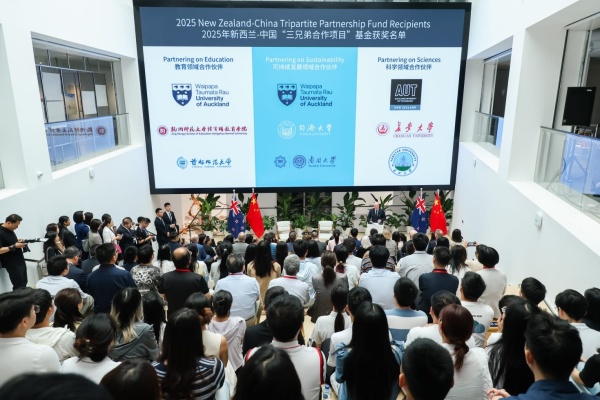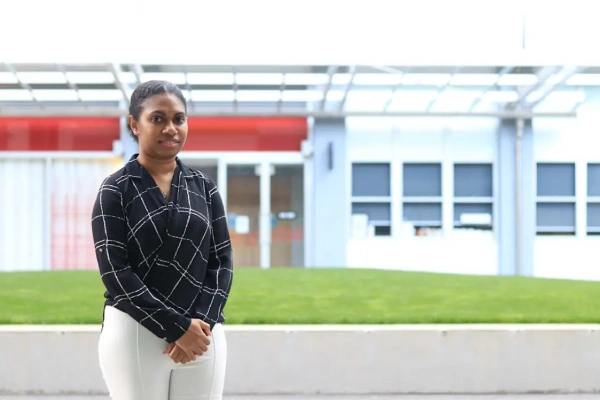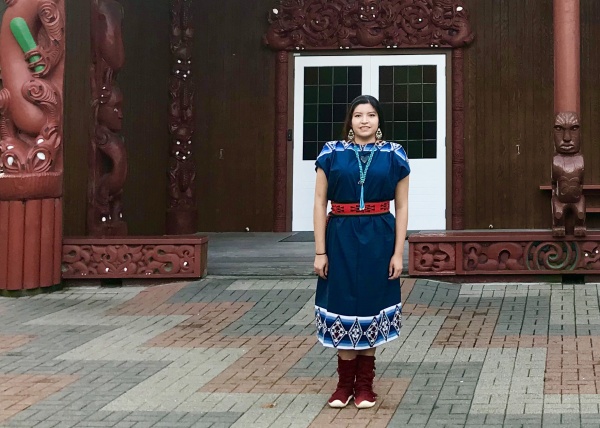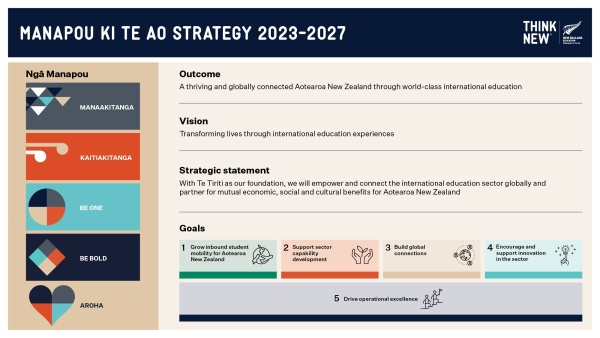Search
Showing 10 of 1803 results for NARSC 2016 July student registration fees
-
Prime Minister unveils 2025 Tripartite Fund recipients at Fudan University
During his remarks at Fudan University, Prime Minister Christopher Luxon announced the 2025 New Zealand–China Tripartite Partnership Fund recipients, as well as plans for a second high-level Education Forum to be held during China Annual Conference and Expo for International Education (CACIE) 2025.

2025 marks 20 years of the New Zealand – China Tripartite Partnership Programme. Photo credit: New Zealand Trade & Enterprise.
ENZ congratulates the following researchers whose projects exemplify the high-quality research collaboration between our two countries:
-
Dr Fiona Ell (University of Auckland): Working with Hangzhou Normal University and Capital Normal University to enhance mathematics and science teacher education through comparative studies and exchanges.
-
Dr Sihong Wu (University of Auckland): Partnering with Tongji and Nankai Universities on sustainable production and carbon neutrality in manufacturing joint ventures.
-
Dr Yiming Ma (Auckland University of Technology): Collaborating with Chang’an and Yangtze Universities to explore mechanisms behind silent earthquakes.
Dr Fiona Ell said she is looking forward to working with her Chinese research partners to enhance mathematics and science teacher preparation, an important focus for education systems in both New Zealand and China.
“Our study brings together teacher educators from two Chinese universities, and teacher educators at the University of Auckland to exchange ideas and techniques for mathematics and science teacher preparation. The Tripartite grant allows us to visit each other, see teacher education practices in each country and compare policy directions in teacher education,” she said.
This will enhance the understanding and skills of all participants and help us find ways to improve mathematics and science teacher education in both countries,” Dr Ell added.
The Tripartite Fund, managed by ENZ in collaboration with several government agencies, supports strategic research partnerships between one New Zealand and two Chinese universities. The programme celebrates its 20th anniversary in 2025.
Learn more about the Tripartite Partnership Fund here.

Professor Nic Smith, Vice-Chancellor Te Herenga Waka – Victoria University of Wellington exchanges a Memorandum of Understanding with Fudan University President, Li JIN. Photo credit: New Zealand Trade & Enterprise.
Another key part of the event was Victoria University of Wellington renewed an agreement with Fudan University to revitalise the relationship, achieve resumption of student flows, and pursue research cooperation in the areas of public health, bio-tech and climate science.
-
-
Aminat chases sustainable energy dream for Nigeria
The former maths teacher and electrical engineering undergraduate has recently returned home to Nigeria after studying renewable energy at the University of Otago’s Energy Research Centre. She completed both a post-graduate Diploma and a Master’s of Science in Energy, Science, and Technology.
“It has always been my dream to study abroad, and New Zealand made my dream come true because I wanted to study renewable energy,” she says.
Manaaki scholarship key to education opportunity
“New Zealand is one of the top five countries in the world which excel at renewable electricity generation, and it is important to study in a country where you can get practical experience.”
Aminat says that the cost of international education overseas is beyond the reach of most people in developing countries, but that her experience was made possible through the Manaaki New Zealand Scholarships, funded by the New Zealand government. When she applied in 2018, she was one of only a small number of students accepted from Africa “so it was a big deal for me”.
And so was getting here. “It was my first experience travelling overseas, my first time on a plane, my first time in a new country.”
But she says she was grateful for the orientation programmes available and quickly felt at home both at university, and in Dunedin. “Just two months after I arrived, the Christchurch mosque shooting happened, and the support I got from my neighbours, my colleagues, and my lecturers was amazing.”
Energy poverty drives study choice
Aminat says she is motivated to study renewable energy because of where she comes from.
“I wanted to study something would allow me to improve my own country. Every economy depends on a reliable power supply and in Nigeria we have nationwide blackouts regularly. We need to buy petrol to run generators. Most people have generators in their homes, even in the cities.
“If you don’t have adequate reliable power, it holds back every aspect of the economy and makes it very difficult for businesses to succeed. It affects everything - manufacturing, schooling, farming. You can’t even freeze excess seasonal crops, so most of it goes to waste.”
A European Union report released last year titled “Time to make energy poverty in Africa a thing of the past”, backs up what Aminat says. It found that nearly 800 million people globally live without access to electricity, about 600 million of them in sub-Saharan Africa.
“In a world of deepening inequalities between the haves and have-nots, this is a glaring injustice, the report says. “Africa is the world’s premium location to harness solar energy and is already demonstrating that a cleaner path is possible.”
“Renewable energy is a passion for me,” Aminat says. “We need to talk about renewable energy for the future in Africa. And the future is now.”
By coming to New Zealand, Aminat says she saw the potential of what can be achieved with a reliable power supply.
Her research, supervised by Associate Professor Michael Jack, explored how to use domestic hot water cylinders for energy storage in microgrids comprised of clusters of households with solar photovoltaic supply. “It’s definitely achievable but needs more research and I’m very keen to take it further.”
International education more than classroom learning
Aminat says studying in New Zealand was “the best-ever experience”, with excellent university facilities and approachable staff always ready to offer help and support.
“Studying in New Zealand has given me a voice. It has expanded my horizons, made me more informed, and opened doors for me. People are keen to listen to you when you talk. When you’re looking for a job, an international education experience makes you stand out.”
“Studying in New Zealand has given me a voice" - New Zealand international student and Manaaki scholar Aminat Razaq
While the quality of education is essential, Aminat says it’s also about what you learn beyond the walls of a classroom. “You learn a different culture, and you are given the opportunity to explore your chosen field of study and gain another perspective. By offering scholarships, you are also helping the country the students come from.”
For any students considering New Zealand as a study destination, Aminat says “don’t think twice”.
“New Zealand is probably the most peaceful place in the world, it has all the facilities you need to study, the researchers are top notch, and the people are welcoming.”
While studying in New Zealand has fulfilled one of Aminat’s dreams, she is already working on another one. “My new dream is to set up my own energy consultancy company and I’m sure I will achieve it. All the positive experiences I have had in my education will take me there.”
And she hasn’t ruled out a return trip to New Zealand. “I am considering studying for my PhD. I loved everything about studying in New Zealand and would love to come back.”
-
Vanessa builds digital skills to help drive change in PNG
She had a diploma in computer technology and a good job with a major telecommunications company, but she also had big ambitions and knew that an international education experience in New Zealand would take her where she wanted to go.
“I saw that there were many areas where digital solutions could really make a difference. It was one of the driving forces which motivated me to study in New Zealand.”
As Vanessa was searching for a university where she could study computer science, her friend returned home from Auckland University of Technology. “She told me so many wonderful stories and I was just so inspired to go and experience New Zealand and AUT for myself.”
“She gave me an idea of what to expect and I knew I would be going into a supportive community. It was only when Covid arrived that I truly experienced how supportive it really was.”
Vanessa came to New Zealand on a Manaaki Scholarship, funded through the New Zealand Aid programme. “It was the reason I could come and I’m grateful for the opportunity.
The value of a Manaaki Scholarship
“The scholarships allow students who are passionate about creating a brighter future in their home countries to gain expertise in their field of our study,” she says. “It also provides exposure to new perspectives and the chance to build life-long relationships with like-minded professionals, which is something I really value.”
Although Vanessa’s father and brother both travelled overseas for education, not many of her friends have. “So now I’m trying to be the influence on my friends, encouraging them to take up that pathway.
“I tell them that in New Zealand you get a fantastic study environment and will meet people from many different backgrounds.”
Vanessa considers that a real bonus to her study experience was the opportunity to take up a summer internship.
“It was optional for my programme, but it was provided through the Pacific Cooperation Foundation for students who were part of the Manaaki scholarship programme. I applied so that I could gain experience working in a large multi-cultural organisation.”
Securing a role at Watercare in Auckland she not only gained valuable work experience, but also professional networking opportunities which have resulted in lasting connections with many of her former colleagues. “I had an amazing manager and I reach out to him from time to time. He has really helped me a lot and he’s one of the life-long contacts I’m going to be holding on to.”
Boosting confidence and career
With her Bachelor of Computer and Information Sciences completed last year, Vanessa is now back in Port Moresby working as a Digital Transformation Associate with PwC and loving her new role.
“Studying in New Zealand grew my confidence as a person and has allowed me to progress my professional career,” she says. “It broadened my horizons and gave me a different mindset.”
Deciding to become an international student takes drive and commitment, but the rewards are worth the effort, Vanessa says. “I spent months researching the options and needed to stay motivated during the year it took to secure my scholarship and place at AUT. It took a lot of planning, but it was something I had my heart set on.
“I knew a degree would give me better opportunities and New Zealand was just such an amazing place to study. It has had a very big impact on where I am now.”
If she had another opportunity, Vanessa says she would head offshore again to pursue a Master’s in Data Science, but for now she is busy convincing her peers of the value of a New Zealand education.
“I tell them this is an opportunity you don’t want to miss. Don’t only go to study, go to really experience New Zealand, the culture, and the people.
“They ask me, what if I don’t get the scholarship and I say you’ll never know if you don’t try, so just go for it. Expect to embark on an adventure of a lifetime.”

-
Māori cultural experience builds lasting bonds for international students
Alongside courses in Māori culture, customs and language, some educational providers in New Zealand have offered an immersive noho marae (marae stay) experience. For students a long way from home, the warmth of the welcome and the sharing of knowledge, traditions, and food, gives them a lasting sense of belonging to Aotearoa.
One of the first educators to recognise the importance of sharing Māori culture with international students is Taituwha King, Senior Lecturer in Māori and Indigenous Development at Auckland University of Technology (AUT). For almost 20 years he has been running noho marae at the beginning of each semester to give international students a comprehensive cultural introduction to their study experience.
Such was the success of noho marae that King developed a course around it, called International Noho Marae – Indigenous Encounters of a Māori Kind, in 2010. It covers basic Te Reo Māori, Māori history, waiata (songs), and cultural customs, and is capped off with a weekend marae stay. It quickly became the second most popular class for international students at AUT, after another of King’s classes – Te Ara Pou Leadership. More than 1500 students have enrolled in the courses since 2002.
“The courses put indigenous goggles on students and open them up to areas of discussion with their own indigenous people,” King says.
Immersing in Māori culture is life changing
This is certainly true for Native American student Hailey Suina, from the Pueblo of Cochiti and Navajo Nation. She travelled to New Zealand on the Education New Zealand Go Overseas scholarship, already curious to explore the cultural connections between the Māori people and the indigenous people of North America.

She describes the time she spent immersed in Māori culture as “life-changing,” and returned home determined to use her experiences to become a leader in her community.
Hailey says she was amazed by the similarities between the Cochiti Pueblo and Māori peoples, which include a collectivist rather than an individualistic culture, a sense of guardianship for nature, and strong ties with ancestors.
“From the moment I arrived, I felt a deep connection with the Māori culture. It was like stepping from one home to another.”
So strong was the concept of whānau and whakawhanaungatanga (kinship connections) for a number of King’s students, that they developed Whānau Councils as a way of staying connected and building on the bonds of their shared New Zealand experience once they returned home. With the first one established in 2010, there are now three - two in the US and one in Europe.
Pre-Covid, students in Europe would meet up annually. King and other AUT staff committed to joining them, cementing the enduring relationship and ongoing commitment of AUT to its alumni.
“Events like noho marae and the Whānau Council meet-ups also provide an opportunity for prospective international students to learn about and consider AUT as a destination to study abroad and build relationships with key employers linked to our alumni,” says King.
Europe council co-founder Anne Heimbeig says being part of the Whānau Council is “a very emotional thing”.
“I’ve met great people from different countries. Together, we’ve overcome lots of stereotypes and wrong assumptions, and brought Māori culture out into the world.”
There was a sense of home, belonging, warmth, and love on the marae, says East Coast USA council co-founder Jessica Cohen.
“Being in the Whānau Council allows us to keep that spirit alive and remember the value of our whānau even when we are far away from our beloved Aotearoa.”
-
Networking starts at home
Space is limited to 50 people so be in quick.
“Wellington is the only location where all three agent groups will cross-over and be in the same place, at the same time,” says Sarah Gauthier, ENZ Regional Project Manager.
“This is your chance to meet and introduce yourself and your institution to 10 highly engaged agencies, without having to leave New Zealand.
“It will be a matter of first in, first served!
“It will be a great evening of networking and worthwhile conversations about New Zealand’s unique education experiences.”
While subject to change, the list of agents includes:
From Korea:
-
Chongro Overseas Educational Institute (C.O.E.I)
-
DnA Education
-
Ilsan Uhak Centre
-
EDM
From Saudi Arabia:
-
IDP (Saudi Arabia)
-
Pillars in Bloom
From Colombia:
-
LAE International Studies
-
Go Study Work and Travel
-
Information Planet
-
New Zealand Option/Australian Option Education
If you can’t make the Wellington event, fear not. The agents will travel separately across New Zealand on different programmes, which are still in development. We’ll be in touch if we are coming to your region or institution.
Sarah says one of ENZ’s biggest challenges is to sustainably grow the number of students choosing to study in New Zealand from a broader range of countries, and to see students study in a broader range of our cities and towns. This networking event is part of that endeavour.
Date: Friday 27 May
Time: 6:00 – 8:00PM
Cost: $30.00 pp
Venue: Shed 5, Queens Wharf, Wellington
Register here: http://enews.educationnz.govt.nz/events/_ET152EXHkeGnQjTdbEypQ
-
-
About us
International education delivers social and cultural and economic benefits for New Zealand.
To support the growth of international education, ENZ promotes New Zealand as a study destination for international students and supports the delivery of education services offshore. It also administers scholarships to help New Zealanders study overseas.
-
Support
To help fuel the continuing growth of New Zealand’s international education industry, ENZ offers services such as advice, funding and agent support.
ENZ’s advice focuses on both business and market development, while its funding streams are available to New Zealand students and to education providers.
-
Tools
ENZ has five sets of tools to assist with international marketing: IntelliLab, Skills Lab, Brand Lab, Agent Lab and the Study with New Zealand website.
Institutions and agents will find everything they need to tell a consistent story about New Zealand’s quality education system and its unique benefits.
NauMai NZ is the official government website for international students who are already in New Zealand or have chosen to study with New Zealand. The site, managed by ENZ, is kept regularly updated with practical information, tips, and advice for living in New Zealand - all in plain English.
-
Business development
Advice is available to help organisations take advantage of the potential for growth in the international education market.
Organisations can take advantage of the advice and support offered by the following services and support for their sector.
On this page:
SIEBA
The Schools International Education Business Association (SIEBA) aims to provide leadership, increased business capability, greater collaboration and stronger representation for New Zealand schools in the international education sector.
Strategic roadmaps
New Zealand’s international education industry has developed strategic roadmaps to guide its future growth to 2025. The roadmaps contain ‘strategic choices’ and ‘specific actions’ that are key to achieving success.
There are roadmaps for individual sectors as well as an overall roadmap for the industry. Find out more here.
Strategy advice
With extensive experience of teaching, marketing and recruiting international students, ENZ’s business development managers give advice to help organisations shape their international growth strategies.
-
Our role
Education New Zealand Manapou ki te Ao (ENZ) is a Crown Agent under Schedule 1 of the Crown Entities Act. ENZ has a dedicated focus on international education and brings the New Zealand Government’s goals for international education to life, bringing benefits to New Zealanders and international learners.
We promote New Zealand as a study destination and support the delivery of education services offshore. We also administer scholarships to support New Zealanders studying overseas, particularly in Asia and Latin America.
Specifically, ENZ...
- leads the future thinking of New Zealand’s international education industry, and drives forward future activities for growth of the industry
- facilitates education industry capability so providers can effectively recruit and support international students
- helps the education industry to identify new opportunities for growth
- leverages the offshore promotional activities of other NZ Inc agencies - such as the Ministry of Foreign Affairs and Trade, Immigration New Zealand, Tourism New Zealand and New Zealand Trade and Enterprise - to raise the profile of New Zealand education
- works closely with other New Zealand agencies to create an environment in which international education can grow and international students can flourish
- provides information to prospective international students and their families about studying with New Zealand
- works with other agencies and the education industry to ensure international students continue to receive a high quality experience while living and studying in New Zealand
- spreads the word about the social, cultural and economic benefits of international education within New Zealand.
Our vision
Transforming lives through international education experiences.
Our outcome
ENZ aims to achieve the outcome of the New Zealand International Education Strategy (NZIES) of enabling a thriving and globally connected New Zealand through world-class international education.
The NZIES 2022-2030 sets out a path for the future of our sector. It guides ENZ’s goals and activities under two focus areas and three goals.
Over the next four years, with Te Tiriti as its foundation, ENZ will achieve its vision by:
- empowering New Zealand's international education sector
- connecting New Zealand education globally
- partnering for mutual economic, social and cultural benefits.
The Manapou ki te Ao Strategy 2023-27 has four goals aligned to the NZIES. The fifth goal – Driver operational performance – underpins the others.

ENZ Strategy 2023 - 2027
For further reading:
Our work to support Māori Crown relationships
ENZ is committed to giving practical effect to the Crown's Te Tiriti o Waitangi (Te Tiriti) responsibilities in our work and giving effect to Te Tiriti obligations in the Education and Training Act 2020. We take a wide and deliberate view of Te Tiriti to build understanding of what it means and how it can contribute to international education in practice.
ENZ is implementing He Rautaki Māori, our Māori Strategy, by weaving the following Ngā Whainga (key objectives) into our activities:
- Facilitating strategic partnerships and connections with indigenous iwi/hapu and Māori providers to deliver international education with, and for, indigenous and Māori communities.
- Embedding the principles of ENZ's Te Tiriti o Waitangi framework into all facets of operation to present the education system as valuing a Māori world view.
- Supporting public sector objectives in Māori-Crown relationships
- Continuing to weave te reo me ōna tikanga into ENZ's purpose, which is to spread the word about the social, cultural, and economic benefits of international education within New Zealand.
Who we work with
ENZ works with New Zealand’s diverse international education industry, organisations and companies that cover seven sectors:

